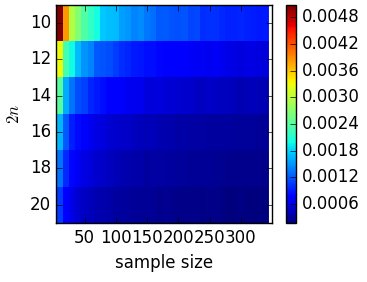I would like to compute the mean $M$ of subsystem entropies $H(x)$ for a physical system $X$ with $2n$ particles and subsystems $x$ with $n$ particles:
$M(X)=\sum_{x\subset X}H(x)\,.$
The number of subsystems $x\subset X$ grows quickly as $n$ increases, so I would like to approximate the population mean $M$ by a sample mean $M'$. I expected that, as the size of the population increases, I would need to increase the sample size as well to get a good approximation of the population mean. However, running some numerical experiments and plotting the standard deviation of $\frac{M-M'}{M}$, it seems that this is not true:

I get the greatest deviations between population and sample mean if the population and the sample size are small. Increasing EITHER the sample size OR the population size seems to solve that problem.
I find this counterintuitive. Why does the quality of the sample mean as an estimator for the population mean increase if I increase the population size while keeping the sample size constant?
